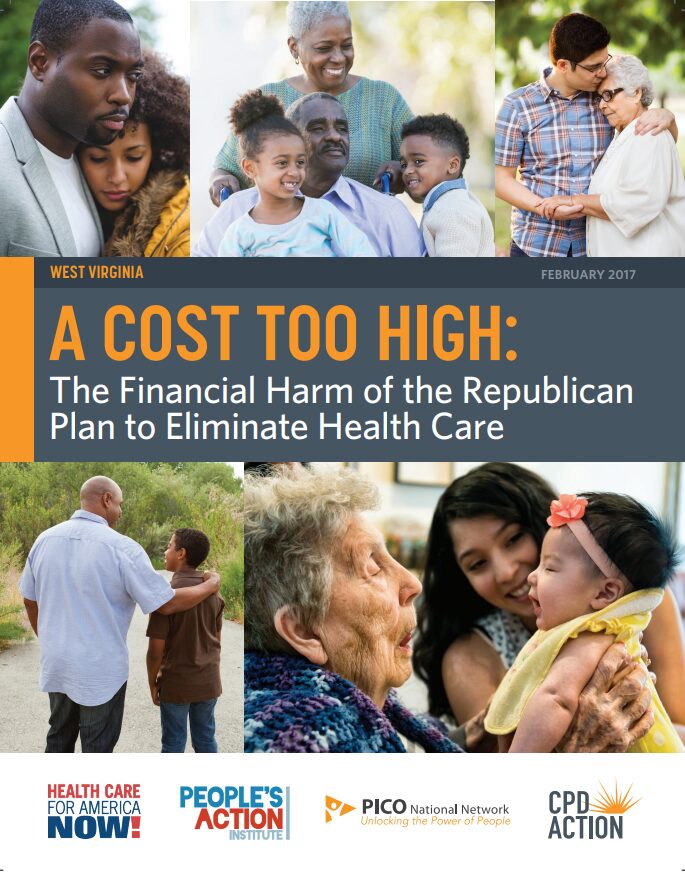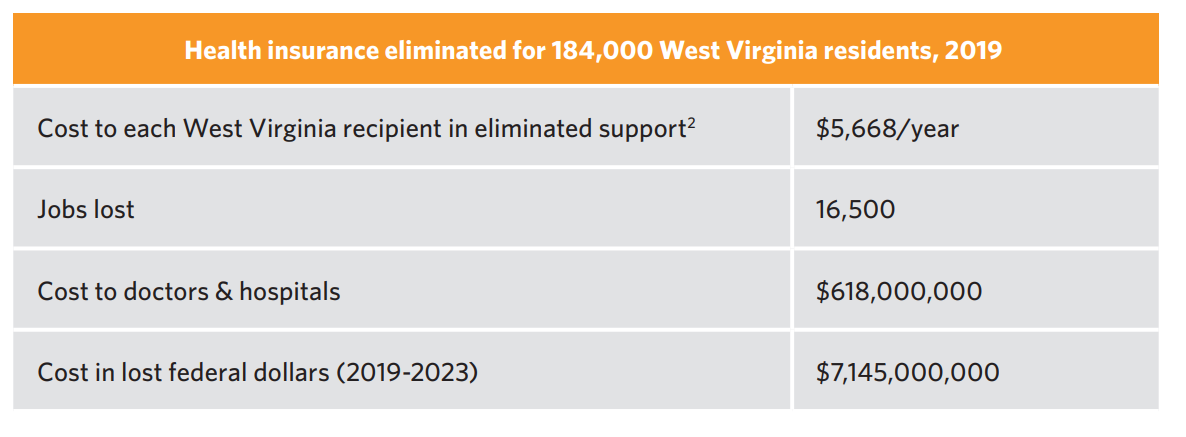- Like
- Digg
- Del
- Tumblr
- VKontakte
- Buffer
- Love This
- Odnoklassniki
- Meneame
- Blogger
- Amazon
- Yahoo Mail
- Gmail
- AOL
- Newsvine
- HackerNews
- Evernote
- MySpace
- Mail.ru
- Viadeo
- Line
- Comments
- Yummly
- SMS
- Viber
- Telegram
- Subscribe
- Skype
- Facebook Messenger
- Kakao
- LiveJournal
- Yammer
- Edgar
- Fintel
- Mix
- Instapaper
- Copy Link

ACKNOWLEDGMENTS
Thanks to People’s Action Institute for the content and analysis in this report. Additional thanks to Center for Popular Democracy Action for design and distribution of the report. People’s Action Institute and Center for Popular Democracy Action are partners of Health Care for America Now and Health Care for America Now Education Fund
Summary
The Republican-led Congress has launched a rapid process of eliminating health coverage for 184,0001 residents of West Virginia by repealing the Affordable Care Act (ACA). These cuts will severely reduce income to health facilities and result in lost jobs across sectors. The cuts also will come at severe cost to the state budget.

Despite these costs, Republican leaders in Congress have begun the process of dismantling the ACA, including repealing the ACA Medicaid expansion and tax credits for ACA marketplace coverage. This would eliminate coverage for 184,000 residents of West Virginia. It is expected that Republicans would attempt further health care rollbacks focused on Medicaid and Medicare.
Instead of eliminating coverage for 184,000 West Virginia residents and 32 million nationwide—as well as causing premiums to double—the President and Congress should ensure affordable health care for all West Virginia residents.
Background
On the first day of the new Congress, Republican leaders began the process of repealing the ACA, which insures millions, bars insurers from discriminating based on preexisting conditions, and prohibits gender discrimination in health care. Republicans have not put forward a clear replacement plan despite widespread public opposition to such an approach.
The ACA Has Expanded Coverage and Made Health Care More Affordable for Millions
Passed in 2010, the Affordable Care Act provides health insurance to 22 million people, primarily by expanding Medicaid (covering more than 11 million nationwide) and offering income-based subsidies for the purchase of ACA marketplace insurance. In addition, the ACA has lowered prescription drug costs for people enrolled in Medicare and made the Indian Health Care Improvement Act permanent. It has closed the coverage gap between African American and white children, narrowing that gap among adults and delivering the biggest reduction in uninsured rates to Latinos—although serious disparities remain. The ACA also provides states with opportunities to develop public systems as an alternative to private coverage offered through insurance corporations.
In West Virginia, more than 180,000 residents receive their health coverage with the help of ACA subsidies or are covered as a result of the Medicaid expansion.
Republican Plans to Eliminate Coverage under the ACA
Both the House and Senate have voted to move forward on repealing the ACA through the budget process. Their plan eliminates the Medicaid expansion and coverage subsidies. As of the writing of this report, Republicans have proposed no replacement for the insurance they will eliminate. Additionally, Republican leaders have also put forward proposals to reduce federal Medicaid funding to states by $1 trillion and replace Medicare with a limited, privatized voucher program.
In early January, a number of Republican elected officials began expressing concern with the approach being pursued by congressional leadership. Gov. Rick Snyder of Michigan hailed the success of his state’s Medicaid expansion and raised concerns about its possible elimination. Ohio Gov. John Kasich of Ohio expressed concern for “what’s going to happen to all those people who find themselves left out in the cold.” Additionally, a number of Republican Senators also urged caution about repealing the ACA without a clear replacement plan. Members of the House Freedom Caucus also expressed concern.
Public Priorities for Addressing Health Care Needs
According to a recent Kaiser Health Tracking Poll, the public’s top priority for the new Congress involves reducing out-of-pocket costs for health care, followed by lowering the price of prescription drugs. More than six in 10 rate these as the highest priorities for Congress. Sixty-two percent also prefer a federal guarantee of coverage compared to thirty-one percent preferring a more limited federal role. Only 20 percent believe Congress should repeal the ACA without providing the details of a replacement.
Despite considerable political partisanship surrounding the ACA, repeal of health reform will strip people of health care regardless of party affiliation, as will capping Medicaid or privatizing Medicare. Indeed, the ACA cut uninsured rates in West Virginia and Kentucky—both red states—by more than 50 percent, placing them among those states with greatest gains under reform. The ACA cut uninsured rates by almost half in Michigan and Ohio, states that went red in the recent presidential election.
In focus-group research conducted by the Kaiser Family Foundation, voters who had supported Donald Trump in the 2016 election “expressed animosity for drug and insurance companies,” while those covered by Medicaid were most satisfied with their coverage. These voters were concerned about health and prescription drug costs, including deductibles and surprise billing, and want any changes to come with lower costs. They said they fear “chaos” if repeal results in a gap in coverage. Those who had been uninsured before the ACA did not want to go without health insurance again.
The Cost of Gutting Healthcare
Voters are right to be concerned. Eliminating health care for 184,000 people in West Virginia will come with substantial human and economic costs for jobs, state budgets, and hospitals. As of 2019, ACA repeal would eliminate $61 billion nationally in tax credits from those who currently depend on these subsidies to afford health insurance. Repeal also would cut $78.5 billion in federal grants to states for the expansion of Medicaid, potentially wreaking havoc on state budgets.
The Cost to People
In West Virginia, 29,163 people receive subsidies toward coverage available in ACA insurance exchanges. Many families also receive support to cover cost-sharing, such as co-payments. The loss of this combined support will cost each recipient an average of $5,668 in 2019.
Additionally, Medicare enrollees in West Virginia benefit from lower prescription drug costs thanks to the ACA. The elimination of this price protection will cost those Medicare enrollees an average of $1,197 a month.
The Jobs Cost
Researchers estimate a loss of approximately 2.6 million jobs nationwide in 2019. The job loss will first hit the health care sector, then ripple out to other sectors as a result of lost wages and purchasing of goods and services.
The job loss in West Virginia will be 16,500.
The Cost to Health Care Providers and Hospitals
Eliminating the health insurance provided by the ACA will reduce revenue to hospitals, community health centers, physician practices, and other providers. In 2019 alone, these providers will lose $146 billion nationwide. Meanwhile, they will be expected to deliver $88 billion in care to people no longer able to pay their bills. The only way for hospitals and doctors to avoid such costs would be to deny care. Both urban and rural hospitals expect to be especially hard hit, with some hospitals facing possible closure.
West Virginia’s hospitals and physician practices will see their income reduced by $618,000,000.
West Virginia’s hospitals would see an increase of $135,000,000 in uncompensated care. Physician practices would see an increase of $64,000,000 in uncompensated care.
The Cost to States
Repealing the ACA would eliminate significant infusions of federal dollars into state economies and budgets (which also support schools, roads, and other services), while loss of business output resulting from the withdrawal of ACA funds would additionally depress state and local tax revenues.
Between 2019 and 2023, the loss of these funds will cost West Virginia residents $7,145,000,000 in federal funds. It will cost $349,000,000 in state and local tax revenue.
Recommendations
Eliminating the Affordable Care Act will cost West Virginia residents dearly when it comes to jobs, the state budget, the stability of hospitals, and family finances. These economic costs will add to the severe human cost of depriving so many West Virginia residents of health care. Instead of eliminating health coverage by repealing the ACA, Congress should:
■ Expand coverage to ensure that everyone in West Virginia gets the health care they need
■ Ensure affordability of care through public investment and price reduction
■ Reduce drug and health insurance corporations’ profiteering and control of our health care system
■ Open access for all to Medicare to provide an alternative to private health insurance corporations
DOWNLOAD PDF HERE:












